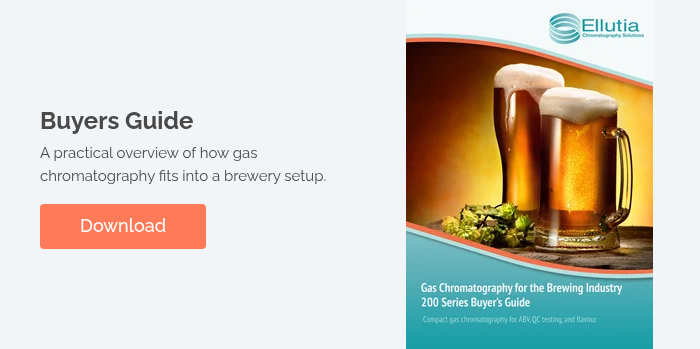Flavour Profiling Alcohol
Application Note:
Alcohol Profiling and Ethanol Breakdown Products
Introduction
Every alcoholic drink has its own balance of aromas and flavours. These come from hundreds of volatile compounds that interact to create the drink’s overall character. Tracking those compounds helps producers maintain consistency, identify faults, and protect product quality.
Flavour profiling uses gas chromatography to measure and separate those compounds. It gives a clear picture of what’s in your product, from key flavour notes to trace compounds that can cause off-flavours.

The Challenge
Flavour consistency is difficult to maintain
Even small changes in raw materials, fermentation conditions, or storage can shift the balance of compounds that define flavour. Oxidation, heat exposure, or contamination can also lead to off-flavours and odours that alter the drink’s profile.
Many flavour compounds exist at trace levels, often thousands of times lower in concentration than ethanol. Measuring them accurately alongside a high ethanol background is technically challenging. Standard analysis methods often miss these subtle but important differences.

The Solution
Analysing flavour compounds using gas chromatography
Gas chromatography (GC) separates and measures each volatile compound individually. This makes it possible to identify both desired flavour compounds and those that cause unwanted aromas.

The Ellutia 200 Series GC, equipped with an EL-FFAP column, provides the sensitivity and precision needed for this analysis. The system can identify a wide range of compounds with accuracy and repeatability.
A range-switching method can also be used during analysis to handle samples with high ethanol content, allowing both ethanol and trace flavour compounds to be measured within the same run.
This approach gives producers a fast and reliable way to assess product quality, monitor consistency, and detect unwanted compounds early in production.
If you’d like a practical overview of how gas chromatography fits into a brewery setup, take a look at the 200 GC Buyers Guide for Breweries.
Method Overview
How flavour profiling is performed using gas chromatography
How flavour profiling is performed using gas chromatography
A small liquid sample is injected into the Ellutia 200 Series GC. The system uses a carrier gas to move the sample through a heated column. Each compound travels at a different rate depending on its chemical properties. As they leave the column, the Flame Ionisation Detector (FID) records each signal, creating a chromatogram that shows the relative amounts of each compound.
Typical GC conditions:
-
Injector temperature: 250 °C
-
Column: EL-FFAP (60 m × 0.32 mm × 0.50 µm)
-
Carrier gas: Hydrogen
-
Detector: FID
-
Injection volume: 1 µL
-
Range switching applied during ethanol elution
Using range switching allows trace flavour compounds to be detected alongside ethanol in one run. This saves time while maintaining high sensitivity.
Watch
How to Prepare Calibration Standards for Flavour Profiling
Learn how to prepare accurate calibration standards for flavour compound analysis using gas chromatography. This step-by-step guide covers standard preparation, dilution, and handling, helping you build a reliable calibration curve for precise flavour profiling.
How to Perform Flavour Profiling Using Gas Chromatography
See the complete workflow for analysing flavour compounds in alcoholic drinks using the Ellutia 200 Series GC. This video walks through each stage, from sample loading to chromatogram review, showing how to capture both major and trace flavour compounds accurately.
Results and Reliability
What the results show
This method provides repeatable and reliable data across a wide range of compound concentrations. It allows producers to measure flavour-active compounds, detect off-notes, and verify that each batch matches the intended profile.
Flavour profiling with the Ellutia 200 Series GC offers a clear and detailed understanding of product composition, helping producers maintain quality and consistency across production.
Learn More
Get the full method and results
If you’d like to see the full details behind this testing method, you can download the complete application note. It includes chromatograms, calibration data, and the exact conditions used for the analysis. It’s a handy reference if you want to check your own setup or compare results.
Download the full application note.
It only takes a few moments to signup.
Frequently Asked Questions
-
What is flavour profiling in alcohol?Flavour profiling measures the volatile compounds that create aroma and taste in alcoholic drinks. It helps producers understand and control flavour consistency.
-
Why use gas chromatography for flavour profiling?GC separates each compound in the sample, allowing you to identify both flavour compounds and off-flavours. It provides accurate, repeatable data across a wide concentration range.
-
Can gas chromatography be used on-site?Yes. The compact design of the Ellutia 200 Series GC makes it suitable for use in production environments, research labs, and quality-control settings.
-
How long does an analysis take?Each GC run typically takes only a few minutes. Once calibrated, the system provides fast, repeatable results.
-
What else can the 200 Series GC be used for in brewing?Alongside alcohol-free testing, the same system can be used for flavour profiling and volatile compound analysis, helping brewers control both product quality and consistency.


